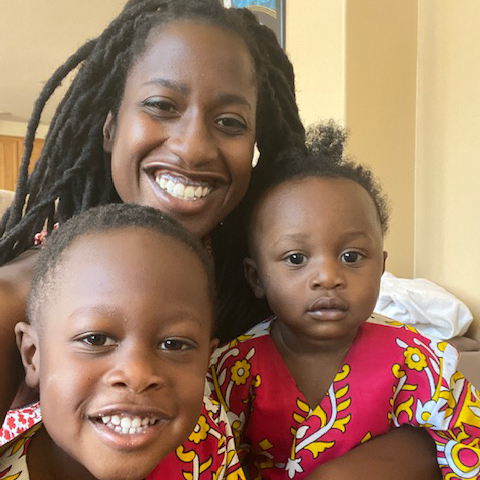 …my experiences in philanthropy have taught me that we, as funders, have tangible resources and real power. That is why I have such high expectations for our sector’s response to Palestine, and why it can feel so wrong when I sometimes observe silence more than solidarity.
…my experiences in philanthropy have taught me that we, as funders, have tangible resources and real power. That is why I have such high expectations for our sector’s response to Palestine, and why it can feel so wrong when I sometimes observe silence more than solidarity.
Essay Archives
Why the path to leading authentically is different for PoC
 We need spaces in which we can gather and be free from the mainstream stereotypes and marginalization that permeate every other societal space we occupy. We need spaces where we can be our authentic selves without white people’s judgment and discomfort. We need a space fully to ourselves to be our full, authentic selves. A space where we can break bread together, heal together, to lead together.
We need spaces in which we can gather and be free from the mainstream stereotypes and marginalization that permeate every other societal space we occupy. We need spaces where we can be our authentic selves without white people’s judgment and discomfort. We need a space fully to ourselves to be our full, authentic selves. A space where we can break bread together, heal together, to lead together.
By supporting BIPOC fundraisers’ growth and amplifying our voices, we usher in a new way of funding movements
 But before pushing for diversity and inclusion, we must really ask ourselves, inclusion of what? Are we aiming to uphold the current status quo in nonprofit fundraising, or are we striving for something that truly transforms our field?
But before pushing for diversity and inclusion, we must really ask ourselves, inclusion of what? Are we aiming to uphold the current status quo in nonprofit fundraising, or are we striving for something that truly transforms our field?
Lessons from fungi: Rediscovering the mycorrhizal connections in our communities, philanthropic philosophies, and reciprocal relationships
 As we know, ecosystems are a place, but they’re more than that—they’re a carefully calibrated community. Applying this understanding to our sector, we must reject the individualism of white supremacy, opting instead to create an ecosystem of love, accountability, and trust.
As we know, ecosystems are a place, but they’re more than that—they’re a carefully calibrated community. Applying this understanding to our sector, we must reject the individualism of white supremacy, opting instead to create an ecosystem of love, accountability, and trust.
Remaking the relationship between nonprofit organizations and schools
 School districts have largely relied on [arts education] organizations to offer arts programming. Rather than address the systemic underfunding of public schools in the U.S., this short-term turned long-term arrangement has created a vicious cycle.
School districts have largely relied on [arts education] organizations to offer arts programming. Rather than address the systemic underfunding of public schools in the U.S., this short-term turned long-term arrangement has created a vicious cycle.
Fundraising is education: Utilizing transformative learning theories to inspire social justice-focused growth and giving
 Given the state of our society, intentionally incorporating educational strategies into your fundraising efforts can be an effective way for your organization to generate support and build a movement for your cause.
Given the state of our society, intentionally incorporating educational strategies into your fundraising efforts can be an effective way for your organization to generate support and build a movement for your cause.
The unbearable hypocrisy: Fundraising in a world of compromised integrity
 Divestment from practices and structures that perpetuate harm is a necessary step towards fostering belonging and ensuring that all employees can thrive.
Divestment from practices and structures that perpetuate harm is a necessary step towards fostering belonging and ensuring that all employees can thrive.
A note to the capitalists in America
 By prioritizing equity in fundraising efforts, organizers can ensure that these communities receive the necessary support, helping to bridge the resource gap and promote fairness. Aligning fundraising efforts with the organization’s mission and values will help to ensure that the organization’s actions are consistent with its principles during fundraising.
By prioritizing equity in fundraising efforts, organizers can ensure that these communities receive the necessary support, helping to bridge the resource gap and promote fairness. Aligning fundraising efforts with the organization’s mission and values will help to ensure that the organization’s actions are consistent with its principles during fundraising.
You’re not feeling imposter syndrome, you are an imposter: Identity and belonging in nonprofit work
 I am an imposter. I don’t belong in the nonprofit sector–as it is. I refuse to subscribe to the underpinning values of white saviorism, colonialism, donor worship, poverty tourism, and overall self-congratulatory air that ‘we came into this sector to do good.’
I am an imposter. I don’t belong in the nonprofit sector–as it is. I refuse to subscribe to the underpinning values of white saviorism, colonialism, donor worship, poverty tourism, and overall self-congratulatory air that ‘we came into this sector to do good.’
Work-life imbalance: I am Black Girl Magic
 I don’t want to define myself by what I do, or my performance. I want to instead be. People pursue what my life looks like because capitalism wills us to. It looks like success. Expectations to look like things are working for you are literally chewing people up and spitting them out…
I don’t want to define myself by what I do, or my performance. I want to instead be. People pursue what my life looks like because capitalism wills us to. It looks like success. Expectations to look like things are working for you are literally chewing people up and spitting them out…
Donor-Advised Funds (DAFs) and changing the sector
 Some nonprofits and a lot of nonprofit workers they surveyed love those mysterious little packages from phantom donors. All I see is unfettered, hyper-individualistic capitalism with little structure to consider community needs.
Some nonprofits and a lot of nonprofit workers they surveyed love those mysterious little packages from phantom donors. All I see is unfettered, hyper-individualistic capitalism with little structure to consider community needs.
My workplace aligned with CCF; they didn’t know it.
 It is easy to feel frustrated when you are passionate about CCF but your workplace does not seem interested or is hesitant to engage. Do not despair! The people where you work might be more aligned than they initially seem.
It is easy to feel frustrated when you are passionate about CCF but your workplace does not seem interested or is hesitant to engage. Do not despair! The people where you work might be more aligned than they initially seem.
